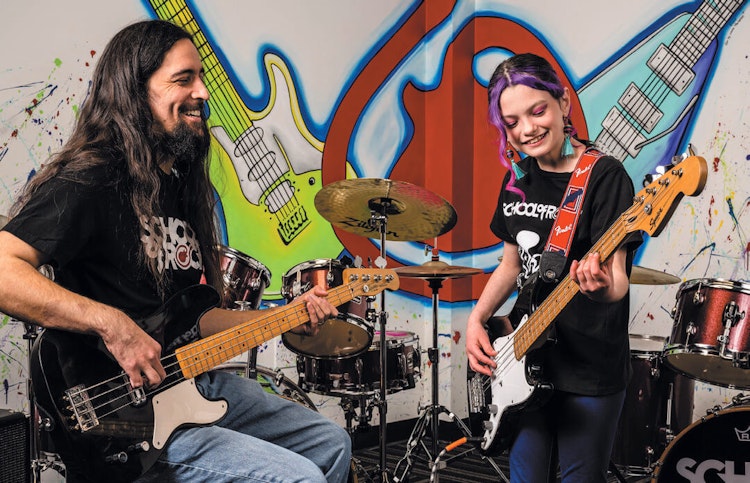From Guitar Hero to online classes and from apps to in-person jam sessions, musicians plug into curricula that get them amped up.
Growing up in a musical family, Matrisha Armitage felt pressured to follow a traditional path in music education. The judgment of others led her to view music as a chore instead of her passion. Just the same, she and the young man who later became her husband started a high school band— something meant to be fun.
Armitage wanted to create music freely and help others do the same. Nearly a decade later, she formed the nonprofit Music Education & Performing Arts Association, which uses group-led jam sessions to support people of all ages and abilities in performing music and arts in safe spaces, free of expectations.
“How we’re teaching seems to work for everyone,” Armitage said. “Teaching is really just being super supportive of helping students know how to find these resources on their own. I think every music education moment needs to be structured for that student.”
Music education is not one size fits all. With technological advances, the way musicians are teaching and learning the craft is dramatically changing musicians’ skills. From video games to online classes and from self-taught apps to traditional music schools, students tune in whatever way feels comfortable to find their groove.
Tech hero
In 2005, the music rhythm video game Guitar Hero revolutionized the way songs were purchased and downloaded during the iTunes era. Guitar Hero and Rock Band posted combined sales of over $105 billion in 2007—more than all of the digital sales for iTunes and ILK. Aside from the game persuading the biggest band in history— The Beatles—to go digital, Guitar Hero influenced younger players to pursue real instruments.
Although Guitar Hero wasn’t necessarily a music education platform, its success shed light on the role technology plays in the evolution of consuming, teaching and learning music.
Today, iTunes no longer dominates the digital music market—new apps bring simple music lessons to our fingertips, phones and tablets carry online sessions, YouTube provides endless video tutorials, and Tik Tok offers quick music tips.
“Technology definitely changes everything,” said Shelle Soelberg, founder of the music education company Let’s Play Music. “There are more shareable resources now than ever before. It’s amazing to be able to distribute that type of work.”
When Soelberg started the company 23 years ago, she used cassette tapes. Now, Let’s Play Music has its own app delivering music directly to students.
Back to school
School of Rock, the global music performance company serving more than 55,000 students, also created its own app as a tool for individual at-home practice. It includes over 1,000 songs, warm-ups, feedback scores and exercises.
“It has been a game changer,” said Sam Dresser, School of Rock’s chief innovation officer. “There’s now an opportunity to not replace what we do in person, but to augment and enhance it.”
Aside from apps like GarageBand, Muse- Score and Flipgrid, musicians are using programs like Coach’s Eye—a sports video analysis app—for educational purposes. Judith Bowman, professor emerita at Duquesne University in Pittsburgh, said educators are using the app to replace in-person performance critiques.
“I talked to one instructor who felt it was important for her students to learn how to teach online,” Bowman said. “It was for an instrumental music methods class. So, she actually had a conversation with the athletics director at her school who was using Coach’s Eye.”
On that app, students can record video and audio, and instructors can analyze the student videos and offer feedback by drawing lines on the video and providing voiceovers.
Most importantly, social media has drastically improved artists’ reach. Emily Sangder, a graduate and now full-time employee of Berklee College of Music in Boston, said technology has created an oversaturation of content, but it also provides opportunities that weren’t there 10 to 15 years ago. With a basic understanding of production software and programs, independent musicians can now record and produce an entire album from the comfort of home.




